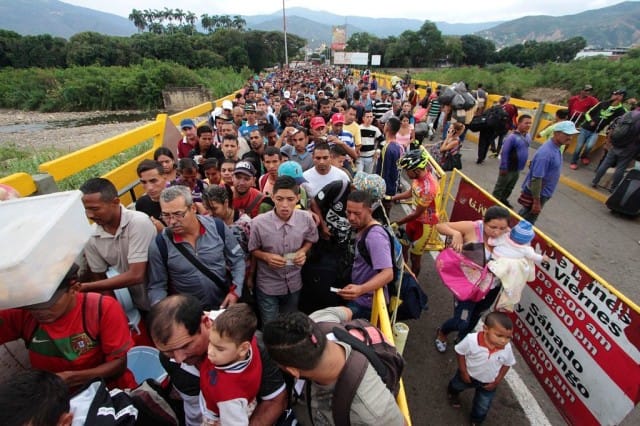Give Me Your Poor, Your Wretched, Your Huddled Masses... Wait. Not That Many. Less Huddling, Please.

"This is rumor control. Here are the facts." -- Warden Andrews, Alien 3
1980 - 2010: The central American region (composed largely of a triangle of countries surrounding El Salvador, including Honduras, Guatemala, and parts of Mexico) begin to collapse economically and politically. The causes are many, beginning with civil war and revolution in the 1980s, but rapidly eclipsed by drug money fueling corruption and violent gangs which in the 21st century outgun every other armed force (including the governments involved).
American response has been limited at best, chiefly because of a lack of willingness to tackle the problem of the huge market in the US for illegal drugs.
2010 - 2014: Central America continues to suffer from civil disorder and violent crime (Honduras and El Salvador both have a staggering murder rate of 90/100k people - the murder rate in Detroit is 40/100k) As part of a larger global migration of refugees from failed states to rich nations (Libya, Syria, Afghanistan, Africa in general) Central Americans begin to flee the region en masse, chiefly for the US (where there has previously been communities of Central American migrants). Among these migrants (who mainly arrive via walking through the violent region for months) are thousands of unaccompanied children. The US is utterly unprepared to deal with this influx. Many of these migrants are economic migrants looking for a way to support themselves and their families, many others flee from gang-related terrorism. Requests for asylum at the border reach an all-time high (despite recent rhetoric, the right of refugees to claim asylum from persecution is recognized by the Geneva Conventions); due to the lack of ability to hold those who request asylum due to years-long immigration court backups asylum seekers are often released into the community. The reaction among Americans is split; many on the US right seek to curtail immigration (legal and illegal entirely) to protect against what they see as a foreign invasion.
2015 - 2016: Donald Trump runs for President. His speech announcing his candidacy is notable for its anti-migrant (specifically anti-Mexican) rhetoric. His campaign, which focuses largely on the threat of violent migrants from Mexico and Central America (it is unclear if Trump understands the difference), although initially dismissed as a joke quickly achieves front-runner status among a dozen other very surprised candidates, and then (by reports surprising even he and his close associates) is elected President.
2017: The new administration seeks to advance its anti-migration agenda, but is blocked by the courts (the complete ban of anyone entering the country from a list of chiefly Muslim countries, widely seen as an attempt to replicate Trump's promise to enact "a complete shutdown of Muslims entering the US until we figure out what's going on") and by legislative infighting (Trump's quixotic quest to erect a physical border wall along the entire southern border, and somehow have Mexico pay for the privilege). Thanks to the inexperience of Trump at governing in general, few actions are actually taken. Migration actually drops during the year, partially due to a sense of American hostility towards Central American migrants in general.
2018: Trump's administration both begins to learn to use the levers of power it has at lower levels (the phrase I've used is "malevolent competence") and also, thanks to the corruption at almost every level of the administration, desperately seeks out distractions on a daily basis. The Attorney General, Jeff Sessions, a long-time immigration hard liner who is estranged from Trump personally thanks to his refusal to act as a personal political secret policeman for the President, along with his long-time aide, hard-right ideologue Stephen Miller, enact a policy of "zero tolerance". This involves closing what is seen as a "loophole" - the ability of Central American refugees to claim asylum status at the border, by refusing to take asylum claims anywhere except at a few defined "ports of entry", and arresting as illegal border crossers anyone who presents themselves as an asylum seeker elsewhere. (Note: this is illegal, as it prevents asylum seekers from actually obtaining safe harbor) Those who arrive at the correct entry locations to undergo a poorly staffed and overwhelmed entry procedure designed chiefly to prevent them from proceeding further.
Until recently, those with families who tried to petition for asylum were not detained as described above. As of May of this year, that was changed. This is why we are now building the infrastructure of detention camps for children and forcing them into an already overcrowded foster care system.
Many of the people who work at the border do their best under this strain to be as professional and empathetic as possible. Many others, to put it mildly, do not.
The core problem, however, is simply this. We have a migrant crisis, as does the world. There are millions of people who are fleeing conditions best described as apocalyptic. How we respond to this defines who we are.
I need not say how we are defining ourselves currently.